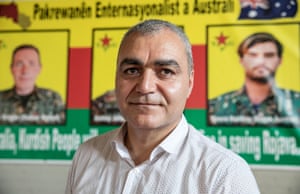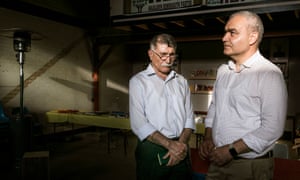The Kurdish community in Australia fears a genocide under Turkey’s military operation
“We are holding our hearts every day, so that they don’t break.”
Abdulrahman Khalil Elyas’s father died in Rojava last week. Because of the bombardment of the Kurdish-controlled north-east region of Syria, he was hastily buried without a funeral.
“People were too frightened,” Elyas says. “It was too dangerous. When people gather, that’s when the bombs come. He was buried without a funeral, without people saying goodbye.”
Elyas’s father was forced from his home in northern Syria by a Turkish operation last year, and lived the last months of his life in a displaced people’s camp before succumbing to a heart attack. Now, Elyas says he fears for his remaining family still trapped in Rojava.
“Every second or third day, I can make contact with them,” Elyas says through an interpreter, speaking Kurdish, the mother-tongue he’s been restricted from speaking for much of his life. “But I worry all day, every day, for my brothers, my sisters and cousins. There are many children. I fear for their future, and for my people.”
Australia’s Kurdish community says it has been devastated by the sudden withdrawal of US troops from north-east Syria, effectively greenlighting a long promised military operation by Turkey to clear the area on its border of what it alleges are insurgent Kurdish forces.Abdulrahman Khalil Elyas’s father died in Rojava last week. Because of the bombardment of the Kurdish-controlled north-east region of Syria, he was hastily buried without a funeral.
“People were too frightened,” Elyas says. “It was too dangerous. When people gather, that’s when the bombs come. He was buried without a funeral, without people saying goodbye.”
Elyas’s father was forced from his home in northern Syria by a Turkish operation last year, and lived the last months of his life in a displaced people’s camp before succumbing to a heart attack. Now, Elyas says he fears for his remaining family still trapped in Rojava.
“Every second or third day, I can make contact with them,” Elyas says through an interpreter, speaking Kurdish, the mother-tongue he’s been restricted from speaking for much of his life. “But I worry all day, every day, for my brothers, my sisters and cousins. There are many children. I fear for their future, and for my people.”
But the Kurdish community in Australia says the allegations of terrorism are fabrications, and that the Turkish operation has far broader objectives: they fear a genocide.
A declared ceasefire has ostensibly ended the current military operation but clashes continue, and the fragile truce has left Turkish troops occupying large swathes of territory in Syria’s north-east, with Russian and Syrian troops controlling the rest of the frontier. Hundreds of Syrian refugees have been forced back into that country by Turkey, and Kurdish semi-autonomous control of Syria’s north-east faces being forcibly extinguished.
In Sydney, members of the Kurdish diaspora gather to comfort each other and to share the latest information on the military operation, the wellbeing of relatives and their hopes for the fragile ceasefire.
Brusk Aeiveri says Australian Kurds are feeling the conflict acutely, compounding generations of disadvantage and discrimination.
“This conflict is on the other side of the world but we feel it like it is here, because these are our families, our people,” Aeiveri says. “And this is another chapter in a long, tragic history. Any Kurdish family, every Kurdish family, is scarred in some way.”

The Kurds, the fourth-largest ethnic group in the Middle East, numbering between 30 million and 40 million, have been campaigning for their own state since the late 19th century.
In the dismemberment of the Ottoman empire that followed the first world war, the borders of a proposed Kurdistan were considered as part of the 1918 armistice negotiations. This was resisted by Turkey, and the plans shelved, with the British and French dividing the Kurdish homeland between the modern states of Turkey, Iraq, Syria and Iran.
A short-lived Kurdish kingdom inside Iraq was crushed by 1924 with the assistance of the British. An autonomous region in northern Iraq was established in the aftermath of the first Gulf war, and the disruption of the Syrian civil war led to the creation of a Kurdish authority controlling the region the Kurds call Rojava in northern Syria.
The Kurds have been locked in uneasy alliance with the US for decades but the Americans have proven capricious allies, alternately embracing and spurning the Kurds as it suited their immediate interests.
It is an old Kurdish aphorism – recently the title of refugee Behrouz Boochani’s book – that the Kurds have “no friends but the mountains”.
“Our mountain is strong,” Aeiveri says. “The mountain is soaked in blood but our mountain is still there.”
"The people who died defending the world from Isis are now under attack."
Aeiveri says the Kurdish diaspora worldwide has felt deeply betrayed by the US’s decision to hastily end its support for the Kurdish-led Syrian Defence Force.
“The people who died defending the world from Isis are now under attack from your so-called allies. Eleven thousand of our people died fighting on your behalf, and now you just walk away and abandon us, leave us to genocide.”
Kurds in Australia have asked the international community – including Australia – to impose a no-fly zone, to install an international peace-keeping force and to provide aid for those displaced in northern Syria.
Another member of the Kurdish community, who asked to remain anonymous, says while the Kurdish diaspora is spread across the world, it remains intrinsically connected to its homeland.
“Being a Kurd is central to my identity, it is who I am. I embrace my new country, I live here and love my new land, but being Kurdish will always be who I am. I was born a Kurd, and I will die a Kurd. And, right now, my people are being killed and the world doesn’t seem to care.”
Members of the Kurdish community say their lives have been “devastated” by the new outbreak of conflict. Many have been forced to stop working, they feel stressed, unable to sleep, even sick with worry.
“But we will fight on,” Aeiveri says. “We will not compromise our humanity.”

No comments:
Post a Comment